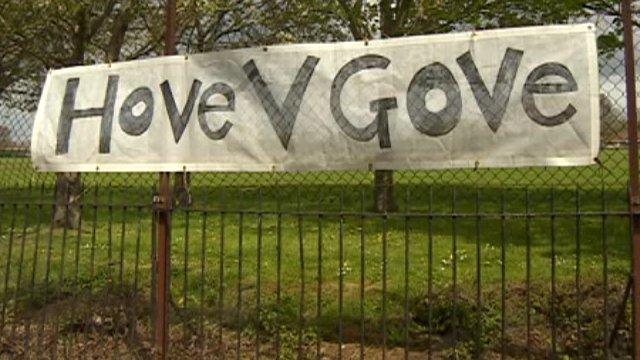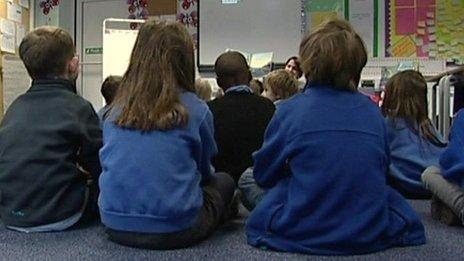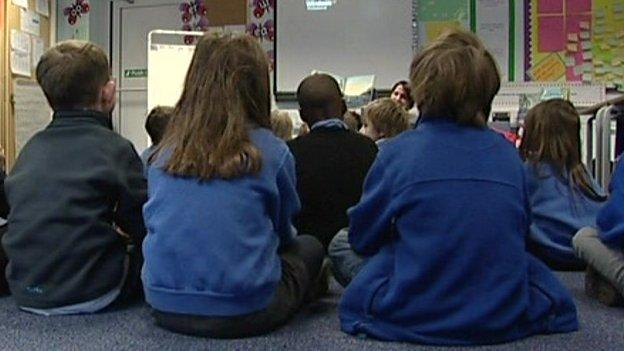New free schools include East End music school
- Published

Michael Gove's free-schools policy has proven to be controversial
A music school for deprived teenagers in east London and two schools for autistic children are among the latest free schools in England to be approved.
From 2014, 102 new free schools are set to open after being granted approval from the Department for Education.
England currently has 81 free schools, with another 109 set to open in September.
Labour and some teaching unions say the expansion is failing to address a lack of primary places.
A report by the National Audit Office in March found 240,000 more places would be needed in primary schools alone by 2014-15.
Of the 102 approved free schools now set to open from 2014 onwards, just 33 are primary and 11 are "all through" schools serving primary and secondary pupils.
'Squandering resources'
The DfE said this latest wave of free schools would create 50,000 pupil places.
In total, 46 of the schemes approved are in London.
The East London Academy of Music (Elam) in Tower Hamlets will work in conjunction with the British music industry to educate 16- to 19-year-olds through music.
And the National Autistic Society (NAS) free schools in Lambeth, London and Cheshire East will serve four- to 19-year-olds with autism.
Education Secretary Michael Gove said: "There are many innovators in local communities set on raising standards of education for their children.
"I am delighted to approve so many of their high-quality plans to open a free school.
"Free schools are extremely popular with parents and are delivering strong discipline and teaching excellence across the country."
'Crisis'
But Christine Blower, general secretary of the NUT, said its research suggested almost £19m had been spent on schools that have yet to open.
"It is extraordinary that at a time when the shortage of primary school places amounts to nothing short of a national crisis that the government is persisting with the folly of its free school policy," she said.
"Less than a third of the approved free schools are primary schools, and... 45% of the new schools will be located in London, which by common agreement already boasts the best schools in the country.
"Education Secretary Michael Gove is clearly letting down parents by squandering resources on schools that nobody wants in places where they are not needed.
She added that at the same time, parents in many areas were facing rising class sizes and schools were seeing a return of temporary classrooms in their playgrounds to cope with the unmet demand for primary places.
Shadow schools minister Kevin Brennan said: "David Cameron and Michael Gove should be delivering for children but instead they're ignoring the crisis in primary places and setting up new schools where there is already a surplus of school places.
"Only a third of these new schools will be primaries. Their damaging focus on their own pet projects is failing to put our children first."
Popularity
Natalie Evans, director of the New Schools Network said: "The free schools movement has accelerated at an unprecedented pace, spurred on by the popularity of places and the increasing support from teachers.
"Regardless of what the teaching unions might claim, with over 70% of the new schools being set up by those working within the education sector itself, the reality is that their members are becoming the driving force of new free schools - particularly in disadvantaged areas where the need for good schools is even more pressing."
A spokesman for the DfE said: "We are spending £5bn by 2015 on creating new school places - more than double the amount spent by the previous government in the same timeframe.
"By September, we expect 190,000 extra places will have been created, with many more still to come. We are confident that our huge investment will mean councils are able to deal with the extra demand for primary school places through building new schools and expanding existing good ones."
Free schools are controversial, with critics saying they could lead to the break-up the state education system.
They can be set up by groups of parents, teachers, charities, businesses, universities, trusts, religious or voluntary groups, but are funded directly by central government.
The schools are established as academies, independent of local authorities and with increased control over their curriculum, teachers' pay and conditions, and the length of school terms and days.
Labour and some teaching unions say they draw money and pupils away from other schools and tend to be located in more affluent neighbourhoods.
There are also fears free schools give too much freedom to faith-based groups or fundamentalist agendas - although schools must show their curriculum is "broad and balanced".
- Published17 May 2013

- Published10 April 2013

- Published9 March 2015
